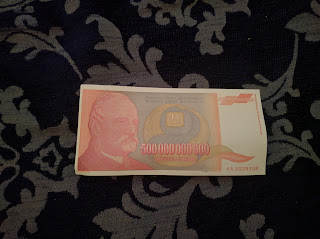G’Day everyone!
I hope this message finds you well. I am in Belgrade, Serbia, and am loving this city! It has character, I’m not sure how else to describe it. The public art and graffiti, the imperfect buildings and structures, the hardy food is simply wonderful.
[I’ve been shopping almost exclusively at one of the many farmer’s markets in Belgrade, Zeleni Venac. Here is a picture of a soup that I made from all locally-sourced produce. Nothing beats homemade chicken and rice soup!]
[Or even my breakfast this morning, which consisted of cabbage, apples, and eggplant!]
As I mentioned in an earlier post, I was not intending to be in Serbia. And, unfortunately, there is no established Serbian school lunch program to look into. The school day excludes the lunch hour - children have school in the morning and go home to eat lunch, or have school in the afternoon (after the lunch hour). Thus, there is no school lunch program.
Despite not having a school lunch program, Belgrade has introduced me to something I haven’t encountered yet in my travels (which spans 13 countries); this is the first city that I have tangibly seen Syrian refugees waiting for relocation to other parts of Europe. When I stepped off of the train, I was astounded by the number of people waiting in parks and other public areas. Aid workers have told me that currently there are 1,200 Syrians in Belgrade who are waiting to be placed in a camp (either inside or outside of Serbia) or program. So, instead of posting about school lunch, I thought I would share a summary of the refugee crisis, and post a link if you’re willing to donate to the refugees currently in Serbia.
*Before I talk about the Syrian conflict, it is important to note that Syrians are not the only ethnic group fleeing persecution from their home countries. People from Afghanistan, Albania, Eritrea, Iraq, Kosovo, Nigeria, Pakistan, and other countries account for over a half million refugees currently in transport.
The Syrian Civil War and Serbia
I cannot do the history of the Syrian conflict justice, so please see BBC News’ history of the conflict. Please read that article.
The Syrian conflict has spanned over five years, and has a death toll of 300,000 to 500,000 people. The conflict has origins back in the Arab Spring, when people sought democracy (via demonstrations that were crushed by the government) and the resignation of President Bashar al-Assad.
Almost 5 million people have fled Syria, 6.5 million have been internally displaced inside Syria. Due to its close proximity to the Middle East, Serbia has faced the brunt of the refugees following the “Balkan route” out of Syria.
The Balkan route to the EU was less well-known than other routes, but quickly gained popularity; in 2012, 6,390 people crossed through this route, according to the EU frontier agency Frontex. In 2013, the number had risen to almost 20,000, and in 2014 over 43,000 were came this way. Although the route was effectively closed in March 2015 when the European Union and Turkey reached a deal to halt the flow of refugees to Europe, many people continue to make the treacherous journey, usually with the help of human smugglers.
The buildup of refugees in Serbia was exacerbated when Hungary closed its borders in September 2015 and passed a policy to detain and expel any refugee or migrant found within eight kilometres of the border without a legal process.
Serbia has been welcoming to refugees, with President Aleksander Vucic saying, ““Refugees are safe and welcome here. Some will stay, although we know they want to go to more developed countries. If they want to stay, we have no problem – these are good, hard-working people.” However, as hundreds of thousands continue to pour into the country, this sentiment may have soured.
Earlier in the year, one of the largest refugee centers in Belgrade was demolished to make way for a redevelopment project. Furthermore, the Serbian government issued a ban last week stating that non-profits are no longer able to distribute resources (food, clothing, etc) to refugees. This is an attempt to move the 1,200+ refugees in Belgrade outside of the city. The problem? There's nowhere to go.
If you would like to support the refugees specifically in Serbia, you can donate here: https://www.gofundme.com/supportras
Best,
Erin
PS I'm a billionaire! Back in 1993, when the Serbian dinar (the Serbian currency) was incredibly volatile due to the Yugoslavian Wars, the biggest bill printed was for 500 billion dinar! It could be worth heaps in the morning, but nothing in the evening. But, hey, being a billionaire at age 22 isn't too bad.





No comments:
Post a Comment